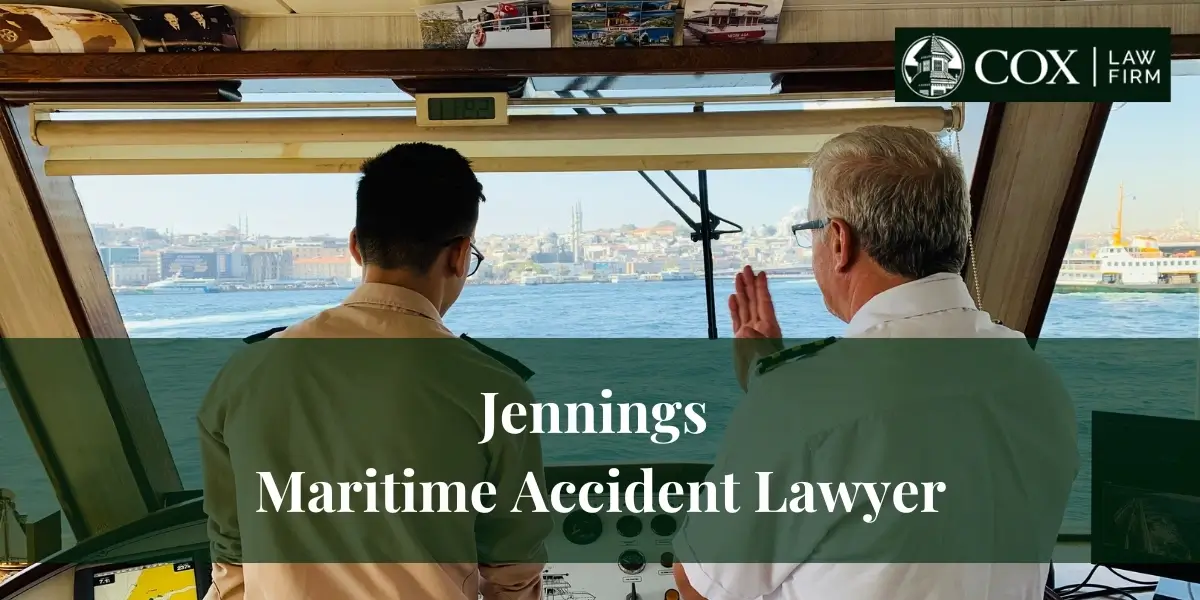Jennings Maritime Accident Lawyer
Jennings Maritime Accident Attorney
Maritime employers have teams ready to protect their bottom line. Injured workers should have a team that is just as ready to protect their rights. If carelessness leads to harm, someone must answer for it. A Jennings maritime accident lawyer can help injured workers rebuild after the unexpected.

Demanding Fairness for Our Clients
At Cox Law Firm, we treat people as more than just a file. It comes from our real belief that people matter. We fight for those injured in dangerous maritime jobs. We know how the system works and how to push back when workers are mistreated.
Types of Maritime Accidents
Maritime jobs carry high physical risk. Some work requires long hours and harsh conditions. Some of the most common types of accidents handled in maritime personal injury law include:
- Slip-and-fall incidents. These injuries can happen on any vessel with wet decks. It’s even riskier if there are narrow passageways. Poor lighting makes falls more likely. Workers can suffer from head and spinal injuries.
- Stuck by equipment. Forklifts move fast. Malfunctions during cargo handling can lead to crushing injuries. These incidents are common at marine terminals. These employ 98,267 people nationwide and see high injury rates.
- Falls. Working on elevated platforms increases the risk of a fall. If a worker is moving between vessels, they could fall into open water. Rescue efforts can be delayed at sea. Drowning is a real danger when safety gear fails.
- Chemical exposure. Offshore platforms store many industrial chemicals. A leak can cause severe injuries. Safety training for properly handling these chemicals is often lacking.
- Injuries linked to vessel collisions. These incidents often happen when vessels operate in poor weather. The damage can be severe when shops crash, even at low speeds.
The fatality rate for water transportation is 18.4 per 100,000 workers, which is much higher than the national average. Even though safety is quite important, it is often not prioritized.
Who Qualifies as a Maritime Worker?
Not every worker who steps near the water qualifies for maritime law protection. Eligibility depends on the type of job. The two main categories are seamen and longshore or harbor workers. Seamen work on vessels that move in navigable waters. They have to spend a large part of their time on the vessel. These workers may file under the Jones Act.
Longshore and harbor workers include those who load ships or are mainly on the docks. They usually qualify under the Longshore and Harbor Workers’ Compensation Act. Their claims follow different rules.
Each group receives different protections. These claims need careful review. Workers with similar injuries can have very different rights depending on where they work.
What to Do After a Maritime Injury
Acting fast after an injury helps protect your rights. The first step is to report the injury to a supervisor. This should happen as soon as possible. The severity of the injury is irrelevant. Medical care is next. Keep copies of all records and reports. These documents form the base of the case.
Avoid signing any statement right away. Insurance companies may try to settle quickly. An attorney can review what happened. They can explain what steps come next. Workers should keep notes about the injury and how it affects their lives.
Injured maritime workers can recover several types of compensation. Which ones apply depends on the facts of the injury. Lost income is a major part of most claims. Medical costs can be high in offshore injuries. The claim can also include all treatment needed now and in the future. In some cases, workers can also seek compensation for mental distress. In rare cases where the employer’s actions were reckless, additional damages may be available.
Why Do I Need an Attorney?
Maritime injury claims follow a different legal track than most personal injury cases. The laws are separate from state systems. This means their standards are different.
Employers often push back. They may try to limit payouts. They do this by pressuring workers into quick settlements. Injured workers need someone who knows how to push back against them.
Maritime workers in the US face higher risks than most other job sectors. A skilled maritime attorney can keep the claim focused by gathering evidence. They can represent the worker to defend against large companies.
FAQs
What Types of Maritime Accidents Fall Under Personal Injury Law?
The types of maritime accidents that fall under personal injury law are related to work on or near the water. These can involve injuries on boats or docks. Common cases include falls, fires, and equipment failures. Accidents during cargo handling can also fall under maritime law. Commercial fishing is also at risk. It carries an injury rate of 441.8 per 100,000 workers.
What Compensation Can Be Recovered in a Maritime Injury Case?
The compensation that can be recovered in a maritime injury case can help workers recover financial damages tied to the injury. Compensation often covers lost wages and pain and suffering. In some cases, workers can also claim maintenance and cure. This covers both living expenses and medical care during recovery.
How Is Fault Determined in Offshore Injury Claims?
Fault is determined in offshore injury claims based on negligence. This usually involves failure to maintain safe working conditions. Courts can also examine the seaworthiness of the vessel. If the ship was unsafe, the owner may be held liable. Evidence like witness statements and inspection records plays a big part.
How Long Do I Have to File a Maritime Injury Claim?
In Jennings, a maritime injury claim under the Jones Act must be filed within three years from the date of the injury. That said, some types of claims may have shorter timelines. For example, claims under the Longshore and Harbor Workers’ Compensation Act require action within one year. The longer someone waits, the harder it is to gather strong evidence.
Injured Working on the Water?
Maritime workers deserve to feel safe at work. This feeling of security is often taken away by injury. These situations are rarely just accidents. Don’t let the company control the story. Schedule a consultation with Cox Law Firm to get answers.
Request Your
Free Consultation
Fields Marked With An “ * ” Are Required

